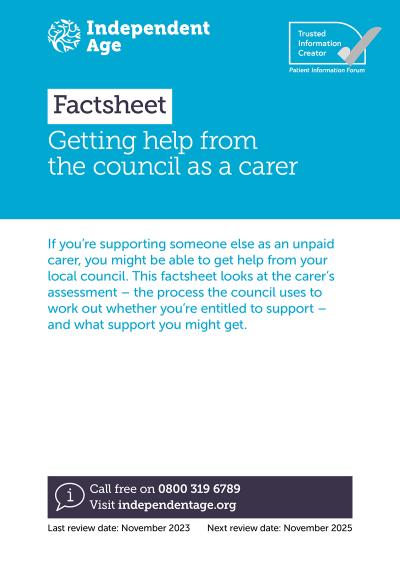Related publications

Getting help from the council as a carer

Future planning: Managing my affairs

You may feel unsure about how to approach an important subject with your friend or relative. Planning ahead can help you have a sensitive and positive conversation.
Prepare your friend or relative for the conversation by letting them know you’ll be talking to them. This gently plants the seed and lets both of you think about the conversation beforehand. It’s helpful to consider the time, place and who will be involved, as well as what you might say.
There will never be a perfect time for sensitive conversations. You should arrange to talk when you both have enough time. Don’t bring up the subject just before an appointment, or when their favourite programme is about to start. And try not to blurt it out when you or they are angry or frustrated.
Make sure you’re somewhere quiet and private where you won’t be disturbed, especially if the subject is likely to be emotional. If you’re talking about housing options, it might be a good idea to talk away from your friend or relative’s home. You could talk when you’re out walking, for example. Try to do it in person, not on the phone.
You may need to think about whether you are the right person to have the conversation with them. For example, it can be hard for a parent to hear advice from their children and emotions can cloud the advice. They might feel more comfortable talking with another family member or there may be some topics that are better dealt with by a professional, such as a GP or a social worker. But try not to involve too many people, so your friend or relative won’t feel that you are ganging up on them.
There could be many options to consider and you may come across some confusing jargon. You can:
Make sure your friend or relative is comfortable and try to bring the subject up naturally. If you are relaxed, they are more likely to be too. Be clear that this is a two-way conversation and you want what is best for them.
You could:
When you do talk to your friend or relative, try to put yourself in their shoes. These could be important decisions for an older person to make.
There’s no need to cover everything straightaway. You can do it in stages.
Keep in mind what you are trying to achieve, which should be their safety, wellbeing and quality of life.
Your friend or relative might welcome the conversation and be more open to the discussion than you expect. If they don’t react in a positive way, there may be valid reasons. Think about how they might react so you can offer them choices or time if they need it.
You might not be the right person to be having the conversation with them. Ask if there is someone else they would prefer to talk to. This could be another friend or relative, their GP or someone in a similar situation.
They might not realise that they need help, or they might be finding it hard to accept that they have an illness or their condition is getting worse. Give examples of things you have noticed and reassure them that they can get help. You might want to leave the conversation and come back to it later when they’ve had time to reflect.
People can be angry because they are afraid, embarrassed or defensive. It may be that your friend or relative is upset about their situation, rather than by you bringing it up. Take your time. This is important to them, and they will need time and space to accept and process their changing circumstances.
Physical issues can make it more difficult for some people to communicate – for example, if your relative has had a stroke or they are living with dementia. You can get advice or support on communicating in this kind of situation from organisations that deal with specific conditions, such as the Stroke Association, Alzheimer's Society or Parkinson's UK.

Prepare for the conversation by thinking about what you'll say, where and who else could be there. For advice, speak with our Helpline.
Look into their options. Start with our website, which has information on topics like health, housing, money and care.
Remember to be patient and listen to what they have to say. Give them time – these could be important decisions to make and they may need to think about them.